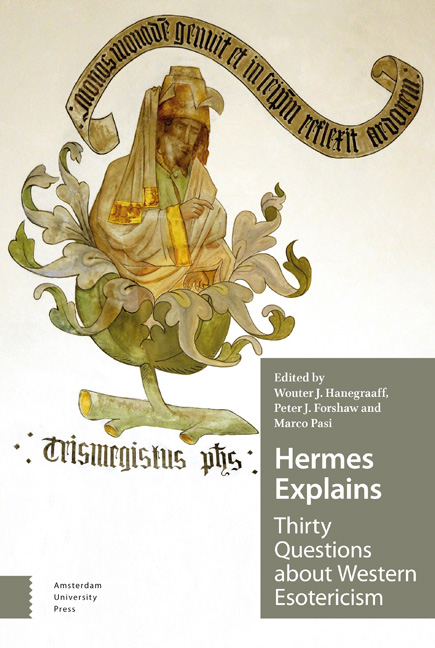Book contents
- Frontmatter
- Contents
- Introduction: Thirty red pills from Hermes Trismegistus
- Aren't we Living in a Disenchanted World?
- Esotericism, That's for White Folks, Right?
- Surely Modern Art is not Occult? It is Modern!
- Is it True that Secret Societies are Trying to Control the World?
- Numbers are Meant for Counting, Right?
- Wasn't Hermes a Prophet of Christianity who Lived Long Before Christ?
- Weren't Early Christians up Against a Gnostic Religion?
- The Imagination… You Mean Fantasy, Right?
- Weren't Medieval Monks Afraid of Demons?
- What does Popular Fiction have to do with the Occult?
- Isn't Alchemy a Spiritual Tradition?
- Music? What does that have to do with Esotericism?
- Why all that Satanist Stuff in Heavy Metal?
- Religion can't be a Joke, Right?
- Isn't Esotericism Irrational?
- Rejected Knowledge…: So you mean that Esotericists are the Losers of History?
- The Kind of Stuff Madonna Talks about – that's not Real Kabbala, is it?
- Shouldn't Evil Cults that Worship Satan be Illegal?
- Is Occultism a Product of Capitalism?
- Can Superhero Comics Really Transmit Esoteric Knowledge?
- Are Kabbalistic Meditations all about Ecstasy?
- Isn't India the Home of Spiritual Wisdom?
- If People Believe in Magic, isn't that just Because they aren't Educated?
- But what does Esotericism have to do with Sex?
- Is there such a Thing as Islamic Esotericism?
- Doesn't Occultism Lead Straight to Fascism?
- A Man who Never Died, Angels Falling from the Sky…: What is that Enoch Stuff all about?
- Is there any Room for Women in Jewish Kabbalah?
- Surely Born-again Christianity has Nothing to do with Occult Stuff like Alchemy?
- Bibliography
- Contributors to this Volume
- Index of Persons
- Index of Subjects
Weren't Early Christians up Against a Gnostic Religion?
Published online by Cambridge University Press: 24 November 2020
- Frontmatter
- Contents
- Introduction: Thirty red pills from Hermes Trismegistus
- Aren't we Living in a Disenchanted World?
- Esotericism, That's for White Folks, Right?
- Surely Modern Art is not Occult? It is Modern!
- Is it True that Secret Societies are Trying to Control the World?
- Numbers are Meant for Counting, Right?
- Wasn't Hermes a Prophet of Christianity who Lived Long Before Christ?
- Weren't Early Christians up Against a Gnostic Religion?
- The Imagination… You Mean Fantasy, Right?
- Weren't Medieval Monks Afraid of Demons?
- What does Popular Fiction have to do with the Occult?
- Isn't Alchemy a Spiritual Tradition?
- Music? What does that have to do with Esotericism?
- Why all that Satanist Stuff in Heavy Metal?
- Religion can't be a Joke, Right?
- Isn't Esotericism Irrational?
- Rejected Knowledge…: So you mean that Esotericists are the Losers of History?
- The Kind of Stuff Madonna Talks about – that's not Real Kabbala, is it?
- Shouldn't Evil Cults that Worship Satan be Illegal?
- Is Occultism a Product of Capitalism?
- Can Superhero Comics Really Transmit Esoteric Knowledge?
- Are Kabbalistic Meditations all about Ecstasy?
- Isn't India the Home of Spiritual Wisdom?
- If People Believe in Magic, isn't that just Because they aren't Educated?
- But what does Esotericism have to do with Sex?
- Is there such a Thing as Islamic Esotericism?
- Doesn't Occultism Lead Straight to Fascism?
- A Man who Never Died, Angels Falling from the Sky…: What is that Enoch Stuff all about?
- Is there any Room for Women in Jewish Kabbalah?
- Surely Born-again Christianity has Nothing to do with Occult Stuff like Alchemy?
- Bibliography
- Contributors to this Volume
- Index of Persons
- Index of Subjects
Summary
Browsing through histories of the ancient Church and modern esotericism alike, one can indeed get the idea that the greatest foe of the first Christians was the “other seed” of the Gnostics, heretics among Christians who were corrupting (or enlivening, depending on whom you ask) the faith with alien elements. Scholarship today has more or less exploded this view, and while the definition of ancient “Gnosticism” and even the use of the term itself remain deeply controversial, most researchers agree that Gnosticism was inextricable from early Christian social milieus. In short, all our external witnesses regarding ancient individuals called gnōstikoi talk about them in a Christian context, all our surviving ancient manuscripts of Gnostic works appear to be products of Christian scribes, and all the theories regarding pre-Christian “Jewish” or “Pagan” Gnosticism have been debunked or rely on distant hypotheticals. Therefore, early Christians were not up against a “Gnostic religion,” because all our evidence about Gnosticism describes individuals related in some way to the emerging phenomenon of “Christianity” – itself an emergent, highly fluid phenomenon at the time. Yet the idea that the Gnostics were a sort of occult “counter-religion” to earliest “proto-orthodox” Christianity has proven extremely difficult to dislodge in our modern imaginations, above all in popular discourse.
The myth of a “Gnostic religion” against which early Christians were opposed is old, and it played a decisive role in the popularisation of the first wave of scholarly research about Gnosticism. In order to understand where this popular view comes from, we ought to look to the modern receptionhistory of our ancient Gnostic sources, almost all of which are preserved in the late Egyptian language known as Coptic. The best-known of these is the Nag Hammadi Library, discovered in December 1945. Less understood and far more influential, however, are the reception and influence of our Coptic Gnostic sources available prior to the Nag Hammadi find, namely the Askew and Bruce Codices.
- Type
- Chapter
- Information
- Hermes ExplainsThirty Questions about Western Esotericism, pp. 61 - 69Publisher: Amsterdam University PressPrint publication year: 2019



